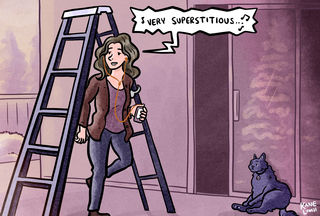Magical Thinking
Very Superstitious
Psychological research explains why most of us are susceptible to superstition.
Posted October 16, 2018

In their quest to understand human behavior and belief, psychologists have studied magical thinking and superstitious behavior for over a century. They note that some superstitious behaviors are intended to avoid or counteract “bad luck.” For example, most Americans wouldn’t get married on Friday the 13th. This common American “bad luck” superstition is what psychologist Gustav Jahoda (1969) called a “socially shared superstition” learned from our culture.
One common cultural superstition is the belief that it’s bad luck to “tempt fate” by commenting on a run of good performance or health or being overconfident. Knocking on wood, throwing salt, or spitting presumably counteract the jinx. More than half of Americans admit to knocking on wood when they feel that they’ve tempted fate. In an experimental study, Keinan (2002) found that high stress increased such behavior, especially for people who were high in the need for control. Risen and Gilovich (2018) found that tempting fate beliefs were positively correlated with magical thinking, an external locus of control (beliefs that luck, fate, and external forces determine success and failure), and a tendency toward intuitive rather than rational thinking.
Many people have personal superstitious rituals and behaviors intended to bring “good luck.” Pre-performance rituals, lucky numbers, good luck charms, and wearing the same clothing item before a performance or sports event are typical examples of good luck superstitious behaviors. Schippers and Van Lange (2006) found that four out of five professional athletes surveyed reported engaging in at least one pre-game ritual intended to boost performance. Psychological research finds that superstitious behavior is most likely when people feel uncertain, stressed, and lacking in control. As superstition researcher Keinan (2002) once said, stress undermines our sense of control and superstitious behavior is a way to reestablish it.
I once had a student who used the tiniest stub of a pencil to take his exam. He declined my offer of a new pencil to replace his two-inch nub. “It’s my lucky pencil,” he explained. “I’ve used it every time I’ve taken an exam and I’ve always gotten an A.” I was tempted to point out the scientific impossibility of a magical pencil and to explain the nature of illusory correlations (how our brain may jump to the conclusion that two things occurring together closely in time are causally connected when they’re not). But he was taking his exam, and besides, I knew that his pencil could indeed be lucky for him. After all, research finds that luck-enhancing superstitions sometimes benefit performance by reducing anxiety and increasing perceptions of control. In other words, superstitions can create self-fulfilling prophecies. For instance, Damisch, Stoberock, and Mussweiler (2010) found that activating good luck superstitions via common sayings, actions, or good luck charms increased confidence and thereby improved performance.
A few weeks ago it was stormy in my neck of the woods and it made sense for me to open my umbrella before stepping out into the rain. But thoughts of bad luck popped into my head and led me to hesitate before proceeding. Indeed, psychological research suggests that superstition is not simply a hobgoblin of unscientific minds and anxious personalities; it is a cognitive default that we may or may not choose to override. Risen (2016) notes that most people acquiesce to irrational beliefs related to the control of good or bad luck even when reflection tells them that not only are their beliefs scientifically wrong, but also scientifically impossible. She suggests that this is because intuitive beliefs are especially powerful, and, that because people often “hedge their bets,” many give in to superstitions just in case.
References
Damisch, L., Stoberock, B., & Mussweiler, T. (2010). Keep your fingers crossed! How superstition improves performance. Psychological Science, 21, 1014-1020.
Jahoda, G. (1969). The psychology of superstition. New York: Penguin.
Keinan, G. (2002). The effects of stress and desire for control on superstitious behavior. Personality and Social Psychology Bulletin, 28, 102-108.
Risen, J. L. (2016). Believing what we do not believe: Acquiescence to superstitious beliefs and other powerful intuitions. Psychological Review, 123, 182-207.
Risen, J. L., & Gilovich, T. (2018). Understanding people’s fear of tempting fate. Journal of the Association for Consumer Research, 3, 599-611.
Schippers, M. C. & Van Lange, P. A. M. (2006). The psychological benefits of superstitious rituals in top sport: A study among top sportspersons. Journal of Applied Social Psychology, 36, 2532–2553.
Vyse, S. A. (2013). Believing in magic: The psychology of superstition. Oxford University Press.
Zhang, Y., Risen, J. L., & Hosey, C. (2014). Reversing one’s fortune by pushing away bad luck. Journal of Experimental Psychology: General, 143, 1171-1184.


